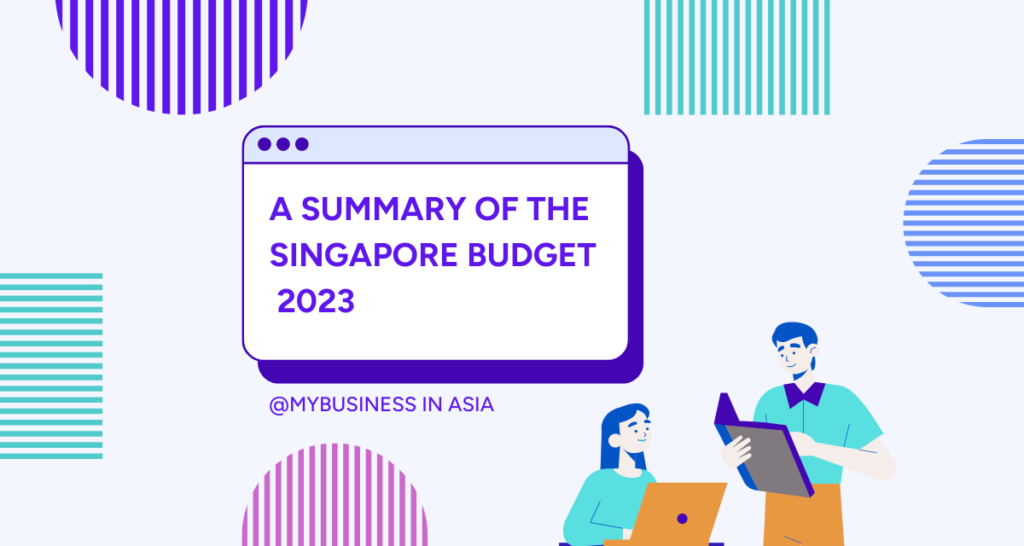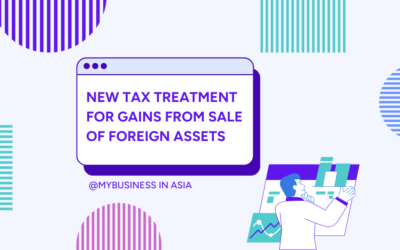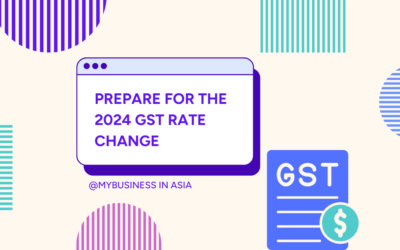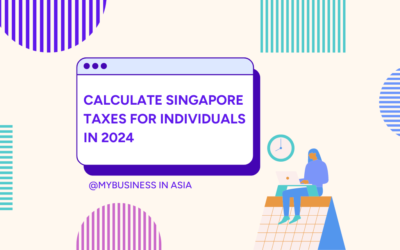
On the February 14, 2023, Lawrence Wong, Minister of Finance, presented the Singapore Budget 2023 in front of the parliament. Here is a summary of the economic outlooks, Schemes and Incentives for companies and Tax update.
As a reminder, the 2023 budget will start from April 1, 2023 to 31st of March 2024 with some measures in place from the announcement by Mr. Wong while others will be delayed until next year or further.
The summary of the whole speech is available on the Ministry of Finance’s website.
Economics overview for Singapore in 2023
Overview of the economic situation for FY 2022
In 2022, the Singaporean economy grew by 3.6% in 2022.
The latest December 2022 resident unemployment rate was 2.8% which was below pre COVID-19 levels.
This is while facing several global economic challenges in 2022:
- The impact of the Ukraine war was significant on a global scale with some shortage of food items and increased energy prices that had some repercussions down to Singapore.
- The global inflation has been fuelled by tightening labour market. Indeed, companies have been incentivising workers with higher salaries which drove the inflation higher.
- Supply chains challenges have been partially addressed but will not return to pre-pandemic’s stability as geopolitical considerations, especially between the United States and China, increased fragmentations of value chains.
Consequently, the Singapore government reported a deficit of SGD 2 billion in 2022, which is equivalent to 0.3% of the GDP.
Notably, the economy has recovered to pre-COVID-19 levels.
To face the pandemic the government drawn SGD 40 billion between 2020 and 2022 on past reserves. This is below the initially expected draw of SGD 52 Bn. To mitigate the deficit of the governmental budget, the Goods and Services Tax (GST) rate was increased from 7 to 8% in January 1st 2023 and is due to increase to 9% on January 1st 2024.

Budget and expectations for FY 2023
In 2023, the global economy is still expected to be growing according to the International Monetary Fund (IMF), but uncertainties remain based on several factors:
- The growth in the European Union and the United States will impact positively (or negatively if in recession) the global economy, and as such, Singapore’s economy.
- The current reopening of China should drive the economic growth through the world and particularly in Asia.
- Although, the Chinese consumptions of commodities (e.g., oil and gas) could increase further the inflation.
- The war in Ukraine is a significant hazard for both the global economy and Singapore since its repercussions can be global as observed through 2022.
The Ministry of Finance estimated the economic growth of Singapore in 2023 to range in-between 0.5% and 2.5%
For 2023, the deficit is expected to be 0.1% of the GDP, about SGD 0.4 billion. The high inflation should be persistent in Singapore at least until June 2023.
The government also announced several schemes to support Singaporeans, and in particular lower-income households and middle-income households. GST Voucher and Assurance Package has been designed to help the Singaporeans with lower incomes to support the price increase due to GST and inflation.
Announced Support Schemes and Incentives for Companies in 2023
Extension of the current EFS and EEG
The government will continue to support innovation and companies in Singapore in a global context of increased national incentives to attract strategic technology companies, particularly in the United States.
Consequently, the government announced the extension of the Enterprise Financing Scheme (EFS) and the Energy Efficiency Grant (EEG) until 31st March 2024:
- The EFS is designed to help Singaporean companies access financing onto several areas: green growth projects, daily cashflow needs, investments in fixed assets, receive financing from Venture Debt and Warrants for innovative enterprises, trade needs, financing of secured overseas projects and acquisition of target enterprises for internationalisation.
- The EEG provides up to 70% financial support for SMEs to improve energy efficiency equipment for companies in the Food Services, Food Manufacturing or Retail sectors, and with a cap of SGD 30,000 per year.
Announcement of the Enterprise Innovation Scheme (EIS)
A new scheme was also announced to help innovative firms, called Enterprise Innovation Scheme (EIS). The EIS will allow from the Year of Assessment (YA) 2024, tax reductions based on qualifying innovation and R&D expenditures within 5 types of activities:
| Qualifying activities | Amount of Tax Deductions and/ or Allowances Granted From YA 2024 to YA 2028 |
|---|---|
| Qualifying R&D undertaken in Singapore | – 100% on R&D expenditure – Additional 300% tax deduction on first $400,000 of qualifying R&D expenditure – Additional 150% tax deduction on balance of qualifying R&D expenditure in excess of $400,000 |
| Registration of Intellectual Property, including patents, trademarks, and designs | – 400% on first $400,000 of qualifying IP registration costs – 100% on balance of qualifying IP registration costs in excess of $400,000 |
| Acquisition and licensing of Intellectual Property Rights (IPRs) | – 400% on first $400,000 (combined cap) of qualifying IPR acquisition costs and/or qualifying IPR licensing expenditure – 100% writing-down allowance on balance of acquisition costs in excess of claim for enhanced allowance – 100% tax deduction on qualifying IPR licensing expenditure in excess of claim for enhanced tax deduction |
| Training via courses approved by SkillsFuture SG | – 400% on first S$400,000 of qualifying training expenditure – 100% on balance of qualifying training expenditure in excess of S$400,000 and all other training expenditure |
| Innovation carried out with Polytechnics and ITE | – 400% on first S$50,000 of qualifying innovation expenditure |
Under the EIS, tax deductions will be raised up to 400% of the qualifying expenditures. The qualifying expenditure will be capped at SGD 400,000 for each activity except for the Innovation with Polytechnics and ITE which is capped at SGD 50,000. The tax savings from the Enterprise Innovation Scheme can go up to 70% of the investments.
Cash Payout for the EIS
Additionally, small and growing businesses will have the option to convert 20% of their total qualifying expenditure per Year of Assessment into a cash payout. This option will be available to companies, sole-proprietorships, partnerships and trusts which employs at least 3 local employees for 6 months or more.
The cash conversion will be in place of the tax allowance / deduction mentioned above. Businesses will not be able to benefit from both the cash payout and the tax allowance or deduction. The tax payouts will not be taxable.
The cash payout will apply to a maximum of SGD 100,000 of qualifying expenditures from 3 categories listed previously. Please note, that for the IP registration and IP acquisition expenditures will only be qualified to cash payout per application basis and are, by default, not allowed.
The cash payout will consist of a cash conversion ratio of 20% of the qualifying expenditures. This means that for SGD 100,000 of qualified expenditures, the cash payout will be SGD 20,000 and no expenditure will be considered as tax allowance / deduction.
Employee Credit Scheme and Credit Schemes for Companies
The government also announced a set of several measures to promote the employment of Seniors in Singapore.
The extension of the Senior Employment Credit (SEC)
The SEC, which partially offsets wages of seniors, will be extended from 2023 to 2025 and more details will be given by the government at the MOM’s Committee of Supply (COS) 2023.
Enhancement of the Enabling Employment Credit (EEC)
The EEC is designed to encourage the hire of Persons With Disabilities (PWDs) through partial wages offset. The PWDs covered will be enhanced and includes additional support for unemployed PWDs for 6 months or more.
Extension of the CPF Transition Offset (CTO)
As CPF contributions increased starting in 2022, the CTO allows to offset the equivalent of the amount of half the CPF increment to the wage for Singaporean seniors.
The government also announced the enhancement of the Progressive Wage Credit Scheme (PWCS)
The PWCS provides financial support to employers who are required to increase the salaries of lower-wage workers and also to those who benevolently increase wages of lower-wage workers. The PWCS will have an increased co-funding from the government.
In order to pursue the upskilling of the Singaporean workforce, SkillsFuture Singapore will incorporate a new role for intermediaries, called Jobs-Skills integrators. The role will be to help update or develop new programmes and trainings to increase the local workforce employability.

Singapore Tax and Contributions Changes in 2023
To finance the increased spending of the 2023 budget, the government announced several tax increases and contributions:
- The Central Provision Fund (CPF) monthly salary ceiling will increase gradually from 6,000 SGD to 8,000 SGD over 4 years starting this year. Although the CPF annual salary ceiling of SGD 102,000 will remain unchanged.
- In details, from September 2023, the CPF monthly salary ceiling will be raised by S$300 to S$6,300. It will go up to S$6,800 from January 2024, S$7,400 from January 2025 and S$8,000 from January 2026.
- The Buyer’s Stamp Duty (BSD) on Residential Properties is also increased from a maximum of 4% to up to 6% for properties above SGD 3 million.
- Non-Resident Properties’ BSD increases from 3% to up to 5% for properties above SGD 1.5 million.
- Adjusted Additional Registration (ARF) will be significantly increased with ARF rates reaching up to 320% for vehicles of Open Market Value of SGD 80,000 and above.
- The excise duties on Tobacco products increases by 15%
- The government also announced intent to implement the Pillar 2 of the Base Erosion and Profit Shifting initiative (BEPS 2.0) with an effective tax rate for Multinational Enterprises to 15% in 2025.
Understanding and Navigating New 2023 Regulations in Singapore
MyBusiness in Asia is a corporate services company that provides tax, accounting, company secretary and immigration services in Singapore and Hong Kong. Our experts are following closely the latest regulation announcements and policies in Singapore. We can structure your projects in Singapore and support your business with the relevant Schemes and grants advising as well as Tax supports.
Do not hesitate to reach out to us to benefit from our in-depth insights and to discuss your business’ projects in Singapore and the Budget 2023.



